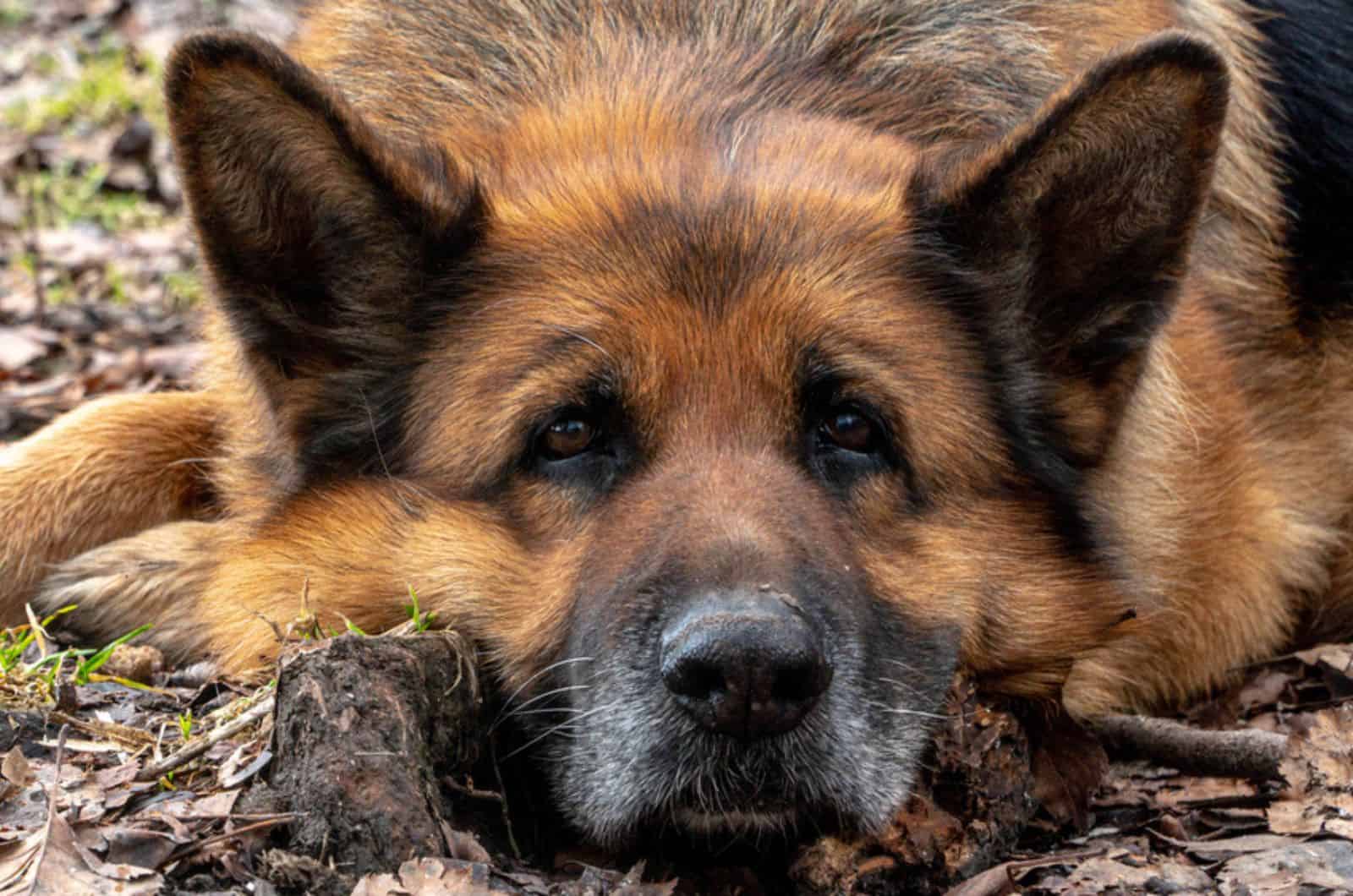Did you know that your fat German Shepherd can have a significantly shorter lifespan than his standard-sized furry friends?
I bet you definitely want to spend the maximum years possible with your dog. Then, you don’t allow obesity to happen. It’s as easy as that, right?
Well, it may not be as easy as you think.
When you get a German Shepherd puppy, you should put him through a routine of regular meals and lots of exercise. If you teach him the wrong habits when he is little, it will continue when he becomes an adult.
But, why do dogs end up being obese if they’re not too gluttonous? What happens inside your dog? What are you not aware of? It has to be something severe to affect his health… that’s for sure.
Proper food intake, along with enough exercise is the formula for a healthy dog. So, why don’t we find a way to fight obesity once and for all?
Help… I Have A Fat German Shepherd!
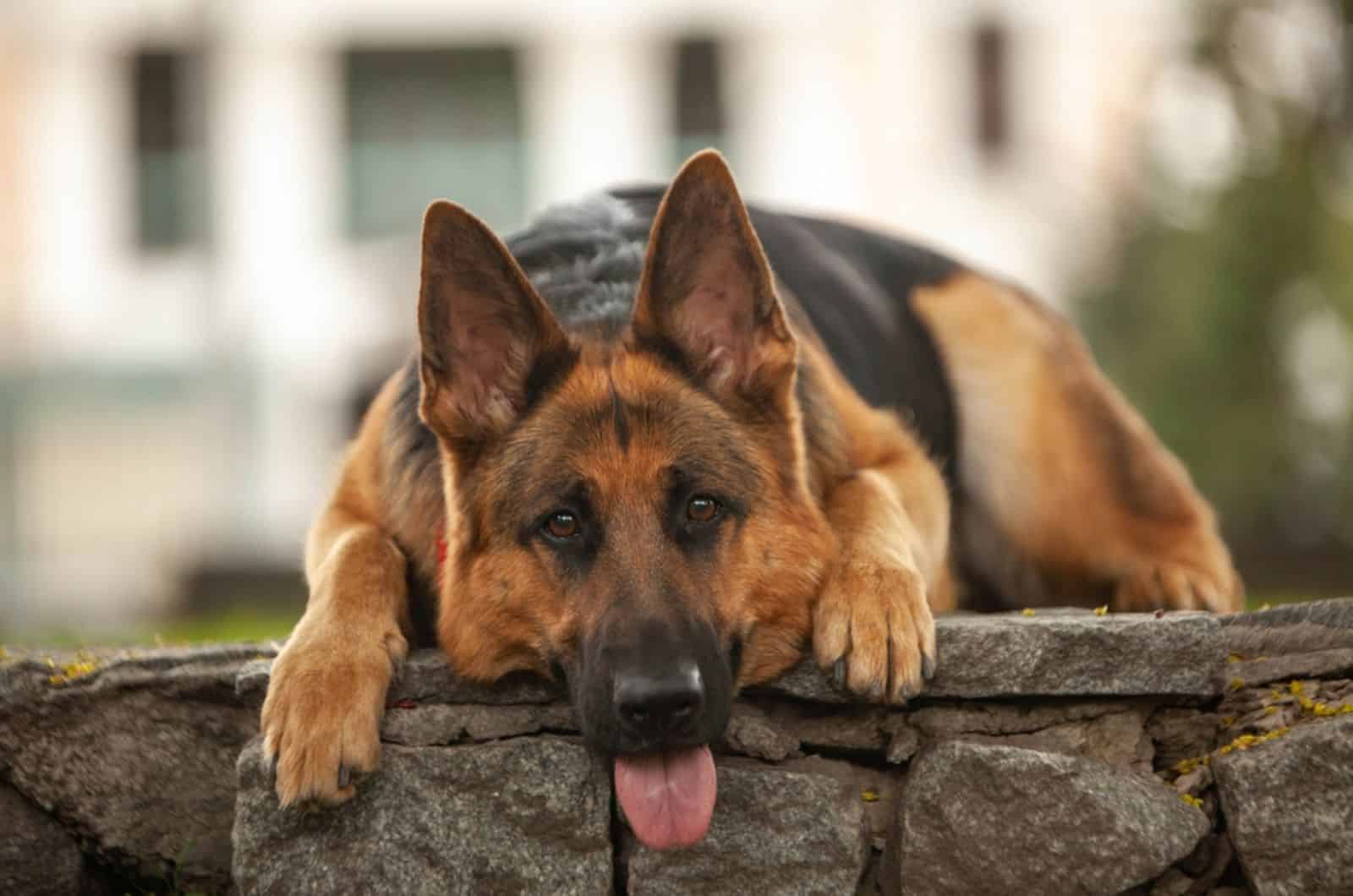
Oh, no! Looks like you have an overweight German Shepherd! How could this happen? Why has your German Shepherd’s weight increased all of a sudden? Overweight dogs don’t get overweight overnight. It’s a process that takes time, and most likely, you’re the one to blame.
Of course, having a fat German Shepherd can mean certain medical conditions. But, that’s a whole other side of the story we’ll get to later.
Usually, fat German Shepherds are fat because their owner feeds them table scraps of human food. As you know, not every type of food is safe for humans AND dogs. Some are even severely lethal! Besides the quality of the food, the quantity is the one to blame for obesity.
Your dog’s diet should have a meal plan every day. I recommend you follow these GSD feeding charts.
Breakfast and dinner are the only meals your dog needs, without any snacking in between. High-quality dog food will maintain an ideal weight. But, poor-quality food in huge amounts can only result in excessive weight.
So, how do you treat obesity? What can being overweight do to your dog? And, why does it occur in the first place?
Let’s find out!
What’s The Normal Weight For A German Shepherd?
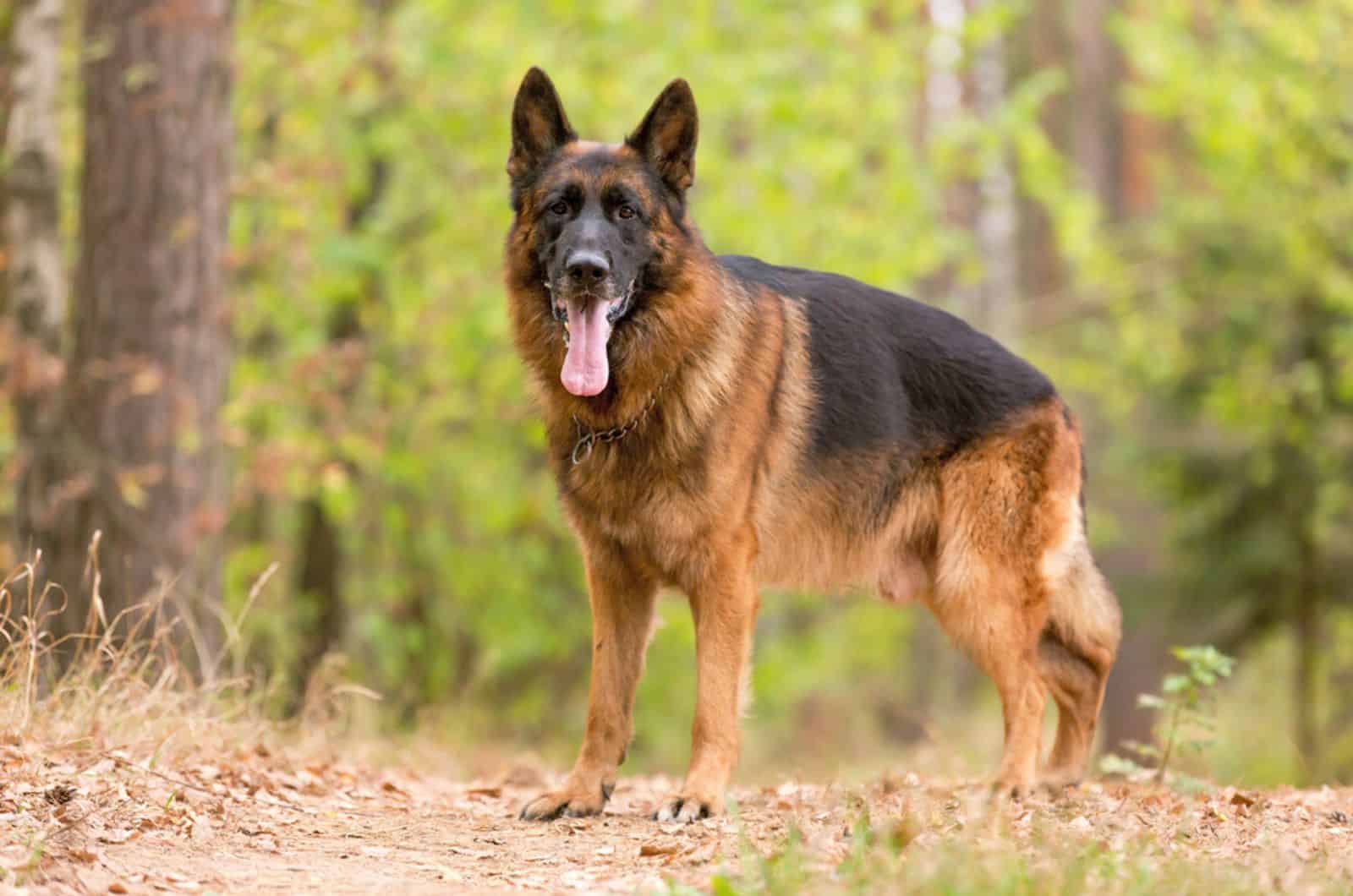
German Shepherds aren’t the biggest dogs in the canine world, but they sure belong to the group of larger dogs. When GSDs were first created, it was to achieve a breed that’s big, well-rounded, and perfectly obedient. Their big size was very much needed so they could tackle any threat that came their way.
Ever since day one, German Shepherds were used as working dogs, serving police and military forces. They were even used during World Wars as messenger dogs, and when the situation called for it, they were used for attack.
Imagine a small dog, i.e., a Dachshund doing all this. That couldn’t be right. They needed someone big and strong.
When you compare male to female German Shepherds, you’ll notice that males are more robust and muscular than females. Females are always smaller, and they appear to be leaner.
An average adult male German Shepherd ranges from 24 to 26 inches at the withers, and weighs from 65 to 90 pounds.
Female GSDs stand tall at 22 to 24 inches, and weigh from 50 to 70 pounds.
A couple of pounds up or down is okay. Not every GSD needs to follow their growth chart blindly. Each dog is an individual. Still, any significant difference in terms of weight can be considered as obesity.
Obesity is an even bigger issue for puppies as well as for senior dogs. It disrupts proper development and growth, and brings many problems in their senior years.
How Can You Tell If You Have A Fat German Shepherd?
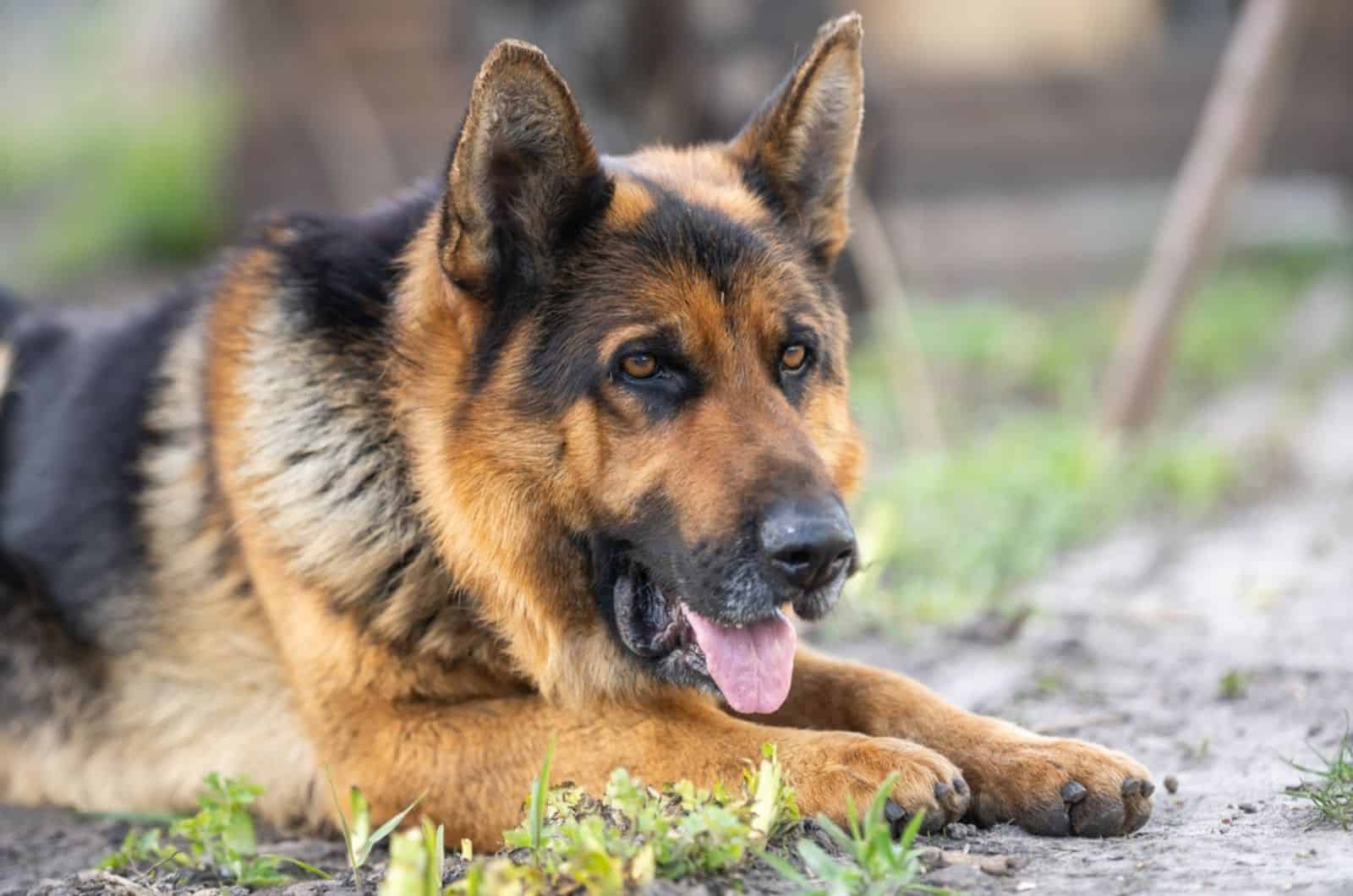
Some people have problems figuring out whether they have a fat German Shepherd or simply a larger specimen of the breed. German Shepherds are naturally bigger dogs. To an inexperienced eye, it may look like a GSD is obese, but, in fact, he’s not. He’s just big and muscular.
There are several signs that could help you determine whether you’re dealing with a fat dog or not, and they can be right in front of your nose!
The Scale Never Lies
Obviously, a large number on the scale is always the first sign of obesity. But, in some cases, it doesn’t have to be. If your German Shepherd weighs more than he’s supposed to, take a look at some other factors like the size of his parents and his body build.
Some dogs are simply bigger than others, even though they belong to the same breed.
Still, if that’s not the case with your dog, and he has fairly normal-sized parents, then it’s obviously a problem with the weight.
The scale is your best friend and biggest enemy in such a situation. It really tells the truth. Your dog is obese, and you need to do something about it before it gets too late.
If you don’t know how much a dog, not just your German Shepherd, should weigh, you can check the AKC’s breed standards, which are determined for each breed.
Round Is A Shape, Right?
Your dog is in shape, and it’s round. Well, round is a shape, right?
If your GSD looks like a barrell, he’s definitely not fit, and needs to be put on a diet.
The German Shepherd dog breed was bred to be active and athletic. They’re always muscular dogs, with a tendency to have an athletic gait.
Obviously, once a GSD loses that natural gait, he becomes too chubby and rounds up. Round is definitely not the shape you want for your GSD. It’s not normal for this breed to not have curves and be round and chubby everywhere you look.
An even bigger problem than being round is having fat rolls. No, they’re not cute and adorable like Pug skin rolls. These kinds of rolls are not desirable because they mean your dog is severely obese.
No Interest In Activities
It’s written in the GSD’s DNA to be active and to love all sorts of activities. These aren’t dogs for inactive dog owners or those who don’t have too much time. German Shepherds need at least an hour and a half of strenuous exercise daily. This doesn’t mean light strolls down the street.
German Shepherds need to run, swim, take a hike with you, play ball, catch a frisbee, etc. They need to get their energy bar drained by the end of the day or they’ll become restless.
Usually, every German Shepherd will drag you to the park the moment he wakes up, or demand that the ball be thrown his way while you’re still sipping your first coffee. But, all of a sudden, you see no enthusiasm like before.
Your German Shepherd isn’t interested in playing with you.
What happened?
No, it’s not because he has had enough of that same ball or he wants something more entertaining. German Shepherds will appreciate any form of interaction.
That’s because he’s not enjoying the activities anymore, thanks to all those extra pounds. It’s hard for your dog to move, run, jump, and play all sorts of games.
Low Stamina
German Shepherds were bred to be working dogs with excellent stamina. Oh… the things these dogs can pull off! They’re considered one of the finest working breeds ever. German Shepherds can easily fight bigger animals than they are or pull much heavier weight than normal.
These are strong dogs with endurance you can only envy.
But, what happens when that endurance simply… disappears!
If you notice that your GSD does not seem to have any more strength to perform his regular tasks or he gets winded after running for only a few moments, then you can suspect his weight to be the main culprit behind everything.
Sudden loss of stamina can only be because your GSD has packed on too much weight. Imagine yourself running with a couple of extra pounds. It’s not as easy as it is when you weigh much less.
Of course, stamina reduces as your dog becomes older. Adult German Shepherds and senior German Shepherds don’t have the same stamina levels. If you don’t notice visible changes in your dog’s weight, but he’s still losing energy and endurance, he’s probably just getting old.
There’s No Natural Tuck
German Shepherds have a rather specific body shape. They have tall legs and a long body that seems to curve in the back. In addition, there’s a rich, bushy, saber-shaped tail.
German Shepherds have an abdominal tuck like most dogs breeds, but they have it more distinguished.
When you look at your GSD from above, you can notice the tuck that forms the dog’s waist. Any absence of this tuck can mean your dog has put on too much weight.
If you’re not able to feel your dog’s ribs easily, and your dog seems more rounded than usual, you should consider putting him on a diet.
The only exceptions to this rule are female German Shepherds… pregnant ones, to be precise. So, first look out for additional details about your dog, then suspect obesity.
Can’t Groom Himself
Dogs aren’t like cats. They can’t easily groom themselves, but they still do some of it. Sure, it’s not the typical licking of the entire fur, but they will keep their body clean.
German Shepherds like to stay nice and tidy. It’s such a shame to see a scruffy-looking GSD because these dogs are so beautiful.
When a dog seems not to be able to groom himself, and looks like he’s not flexible anymore with doing it, then he’s definitely overweight.
Dogs should be able to do the minimum grooming, i.e., licking their private parts. It’s gross, I know, but it’s something dogs just do.
It’s not easy to bend when you’re chubby. If your GSD can’t do it, then he’ll most likely stop grooming himself, and you’ll notice the difference.
Fat All Over Your Dog’s Body
You should be able to feel your dog’s ribs easily, without any fat covering them. The ribs shouldn’t be protruding either… just in between.
However, when you notice it’s hard to feel those little bones of your dog’s rib cage, he’s most likely getting chubby. A layer of fat covers your dog’s ribs, as well as the rest of his body. Dogs shouldn’t have layers of fat. It doesn’t protect them from the cold… that’s why they have a double coat.
Fat isn’t a good thing for an active dog. Everything extra besides his normal weight will be considered an obstacle to a normal life. Just imagine how hard it could be to move around with all that fat?
What Are The Reasons Behind The Excessive Weight Of Your GSD?
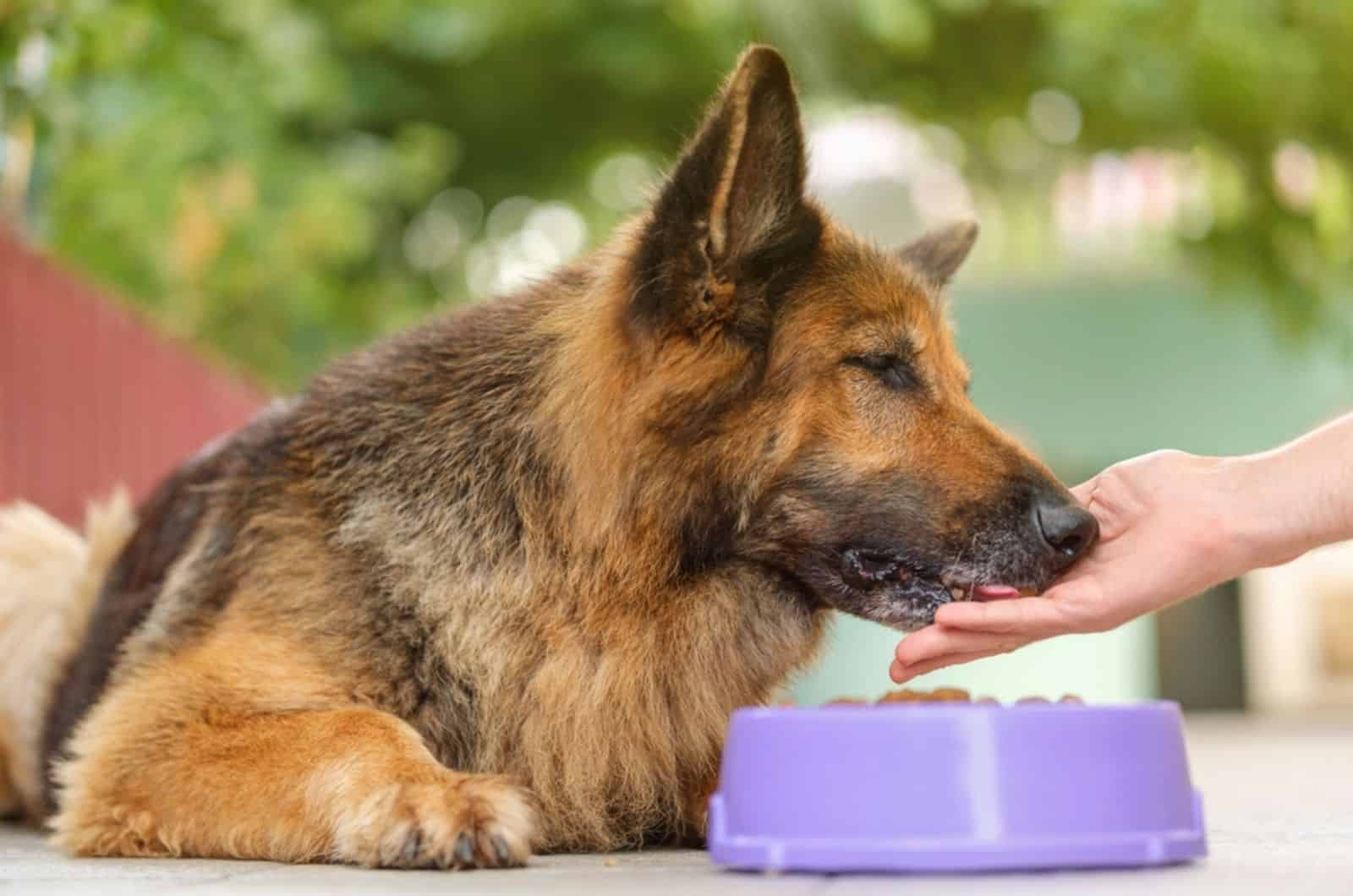
The reasons behind having a fat German Shepherd can either be environmental or a result of their health condition.
Of course, one of the biggest reasons for having a fat German Shepherd is the owner himself. Inadequate care for German Shepherds can result in obesity. If you don’t feed your dog the good kind of kibble, and don’t let him exercise regularly, you will end up with a fat dog.
Obesity is not something that happens overnight. You encourage it by feeding your dog poor-quality food packed with grains, as well as feeding him treats all the time. Your dog should have a healthy, balanced diet. If you’re not feeding yourself junk food, then why should your dog eat it?
Dog food for your German Shepherd should be focused on proteins, vitamins, minerals, and amino acids. Empty carbohydrates are never welcome. They just give a sense of false fullness and help pack on extra pounds.
Something you can’t have an effect on is your dog’s proneness to certain health conditions. Thyroid gland problems are usually the biggest reasons behind weight problems, whether they cause underweight conditions or overweight ones.
In this case, the main reason behind having a fat German Shepherd could be hypothyroidism. The thyroid gland stops producing enough thyroid hormones for your dog, which results in slower metabolism and easier weight gain.
Cushing’s disease is another condition that results in excessive weight. It’s a condition that causes too much of the hormone, cortisol, in the dog’s body. This disease leads to insulin resistance and fat buildup, which can only lead to severe obesity.
Lastly, I want to address something that a lot of dog owners aren’t aware of. Your German Shepherd’s weight can drastically change after spaying or neutering. That’s why your vet will schedule your dog for the procedure and put him on a restricted diet.
If the pre-operation diet is skipped, then the dog will have much more of a chance of becoming overweight after the surgery.
Is Your Fat German Shepherd At Risk Of Having Severe Health Problems?
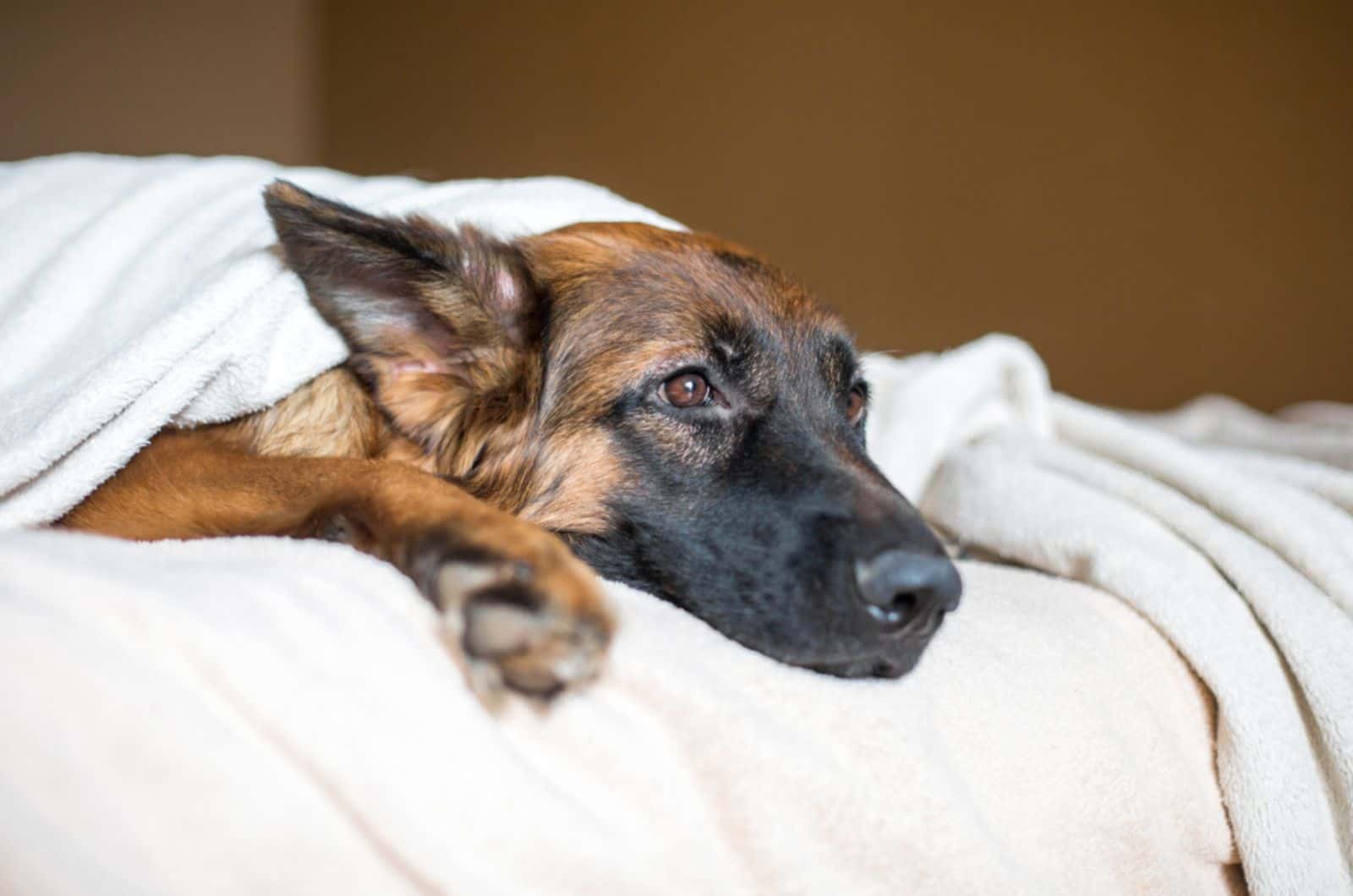
Oh, yes! Your fat German Shepherd is very much at risk of developing severe health issues. Obesity is not a good condition for any dog, not just for your German Shepherd. The excessive weight gain can be a result of certain health problems, and it can cause additional ones.
When you see an obese dog, the first health problem that comes to your mind is definitely mobility issues, right? That’s a clear problem with all larger dogs.
The biggest health risk for a fat German Shepherd is definitely arthritis, followed by joint problems and weak cartilage. Arthritis isn’t a condition that affects senior dogs only. There’s a fine line between obesity and arthritis.
Being an active dog by nature, German Shepherds are already prone to developing arthritis. They don’t need obesity in the game, too!
Another major problem for fat German Shepherds is laryngeal collapse. Dogs that suffer from obesity are more likely to have this issue as laryngeal collapse progresses rapidly with them.
What affects all obese dogs, not just German Shepherds, are multiple heart conditions that could develop from obesity. Unfortunately, fat German Shepherds are at risk of getting a heart attack. Such conditions are usually immediately fatal.
An obese German Shepherd should be under vet’s watch all the time so no severe health conditions could develop until the dog loses that extra weight.
What Should German Shepherds Eat In Order To Lose Weight?
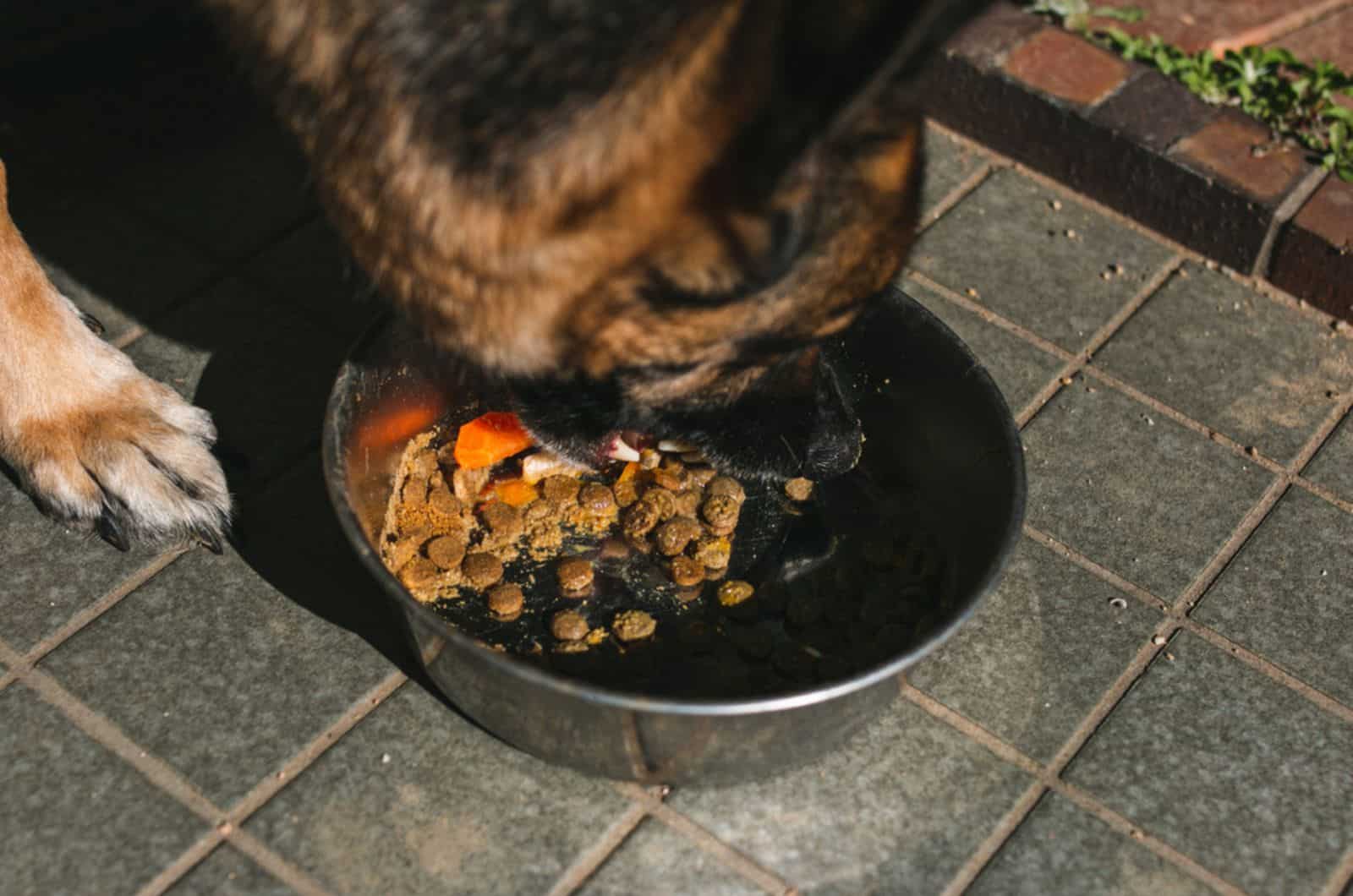
There is no magical formula for obese dogs. A fat German Shepherd will most likely eat the same kibble brand as he did before. The catch is in a reduced amount.
Sometimes, your vet might prescribe a special kibble formula developed for obese dogs. That should help him lose weight. However, it’s crucial to reduce the amount of kibble by 10% to 20% daily. Treats are strictly off limits!
Your fat German Shepherd shouldn’t be on a formula that has too much grains and fats added. Stick with lean meat, preferably fish, and try to find a brand that adds lots of veggies and superfoods to the recipes.
If you really must use treats as part of your training lessons, then pick dog-safe fruits or veggies. My personal favorites are carrots and broccoli, but my dogs love Brussels sprouts, too! These are a healthy alternative instead of store-bought treats packed with who knows what!
What you need to know about feeding a fat German Shepherd is that no harsh diet is recommended. Your GSD shouldn’t be put on a diet all of a sudden because that can cause a shock to his body and put him under lots of stress.
Reduce the amount of kibble gradually, and watch your dog to see if it suits him. Basically, every time there’s extra kibble left in the bowl, that’s a bad sign. It means your dog is already full, and doesn’t need that amount you served him.
The best food for a German Shepherd can be found here. But, I also encourage you to try a raw diet for German Shepherds. It’s super beneficial, and almost never leads to overweight conditions.
Exercise Time For A Fat German Shepherd
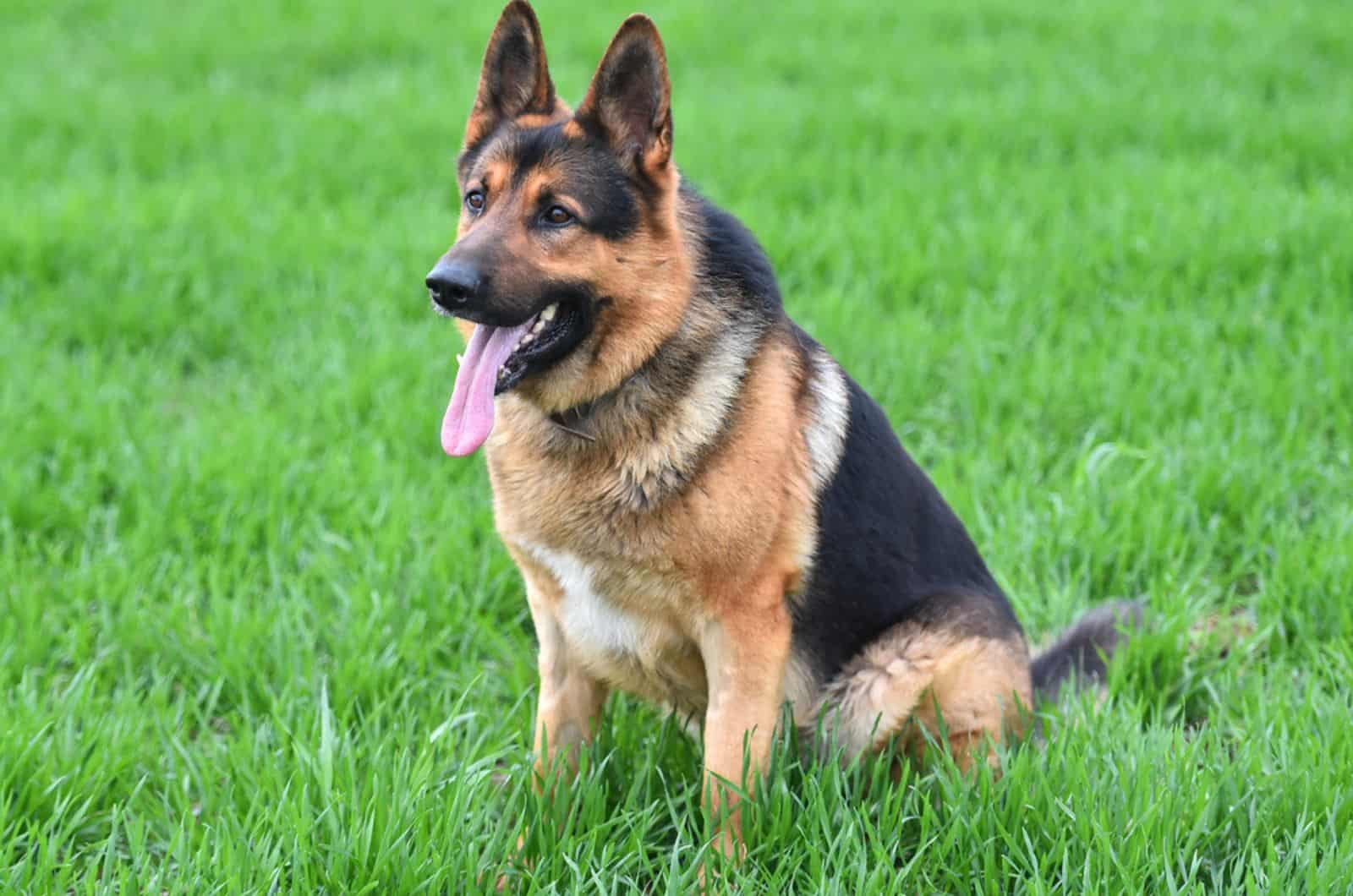
German Shepherds are naturally active dogs. A normal-sized GSD needs lots of daily exercise. Some dogs require up to 2 hours of strenuous workout. You should monitor your dog to see what he likes and dislikes.
Some dogs will find only an hour to be effective for them while some might need more. That’s totally up to the dog to decide.
But, the bottom line is: your GSD needs exercise.
A fat German Shepherd shouldn’t exercise immediately for two full hours. This could not end well, especially for their bones and joints, which are already under a lot of pressure. Start with light exercises. Take them on longer walks, and gradually introduce games and more strenuous tasks.
If you have stairs in your building, take them instead of the elevator. Take small, puppy steps and the results will be noticeable.
Your fat GSD might not be too interested in such a workout regime, but he will warm up to it. It’s important to stay active and maintain a healthy weight once your dog drops those extra pounds. So, as soon as he’s done with the weight-loss program, you can introduce a full exercise routine.
To Sum Up…
As you can now see, the activity level, a lack of exercise, and the presence of poor dog food can all be reasons why you have a fat German Shepherd. However, they’re not alone. Health conditions are pretty much to blame, too.
If you have a fat German Shepherd, you should put him on a weight loss plan. Being overweight isn’t good for your dog in any way. Not only will it limit your dog’s mobility, but it will also increase risks of numerous health problems, i.e., heart conditions.
Obesity is not something you want to battle with, especially since it can be prevented. A healthy diet, along with the proper exercise routine and regular vet checkups are all you need to maintain your dog’s ideal weight.
With all the problems today, the least you need is a fat German Shepherd.
